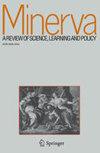教师培训和技术
IF 3.2
2区 哲学
Q1 EDUCATION & EDUCATIONAL RESEARCH
引用次数: 0
摘要
本文章由计算机程序翻译,如有差异,请以英文原文为准。
FORMAÇÃO DE PROFESSORES E AS TECNOLOGIAS
求助全文
通过发布文献求助,成功后即可免费获取论文全文。
去求助
来源期刊

Minerva
Multiple-
CiteScore
5.20
自引率
4.30%
发文量
26
期刊介绍:
Minerva is devoted to the study of ideas, traditions, cultures and institutions in science, higher education and research. It is concerned no less with history than with present practice, and with the local as well as the global. It speaks to the scholar, the teacher, the policy-maker and the administrator. It features articles, essay reviews and ''special'' issues on themes of topical importance. It represents no single school of thought, but welcomes diversity, within the rules of rational discourse. Its contributions are peer-reviewed. Its audience is world-wide.
 求助内容:
求助内容: 应助结果提醒方式:
应助结果提醒方式:


